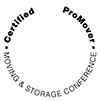
Fortunately, it doesn’t have to be that way. Depending on your situation, if you get started early and take advantage of these helpful tips—your move might even pay for itself!
Read on to learn how you can save a bundle by thinking strategically and creatively about:
- Boxes
- Packing Materials
- What to Move & What Not to Move
- The Move
- Cleaning Supplies
- Monthly Bills
The Keys to Moving on a Budget
Whether you prefer to leave the hard work to the professionals and pay for moving companies, or choose to pay for as much as possible with sweat-equity, there are plenty of ways to improve the bottom line when you’re moving on a budget.
Tip #1 – Boxes
Sourcing boxes for your move is one area where paying for convenience can quickly add up to a costly move. Boxing as much of your household as you can yourself is a great way to reduce the cost of professional moving services. Finding free or reduced-price options for getting the boxes you need is another.
One way to cut costs on boxes is to visit local businesses in advance of your move. Often times they’ll be happy to let you know what days they receive shipments and even happier to have you take some of the boxes that their shipments arrive in. Another option is to look on Facebook Marketplace or Craigslist to see if somebody is offering free or cheap boxes after their own move.
Tip #2 – Packing Materials
It definitely won’t pay off in the long run if you cut costs on packing materials only to find yourself faced with the cost of replacing items that got broken during your move. Still, with a little bit of creativity you can probably cut down on the cost of tape, packing peanuts, and other supplies.
When it comes to scissors, tape, and other items that you could purchase through a moving supply store—consider whether there are options that will work just as well available from your local dollar store. When it comes to materials to cushion the items in your boxes, see how far you can get by reusing old newspapers, magazines, t-shirts, and even pillows.
Tip #3 – What to Move & What Not to Move
If there are things in your home right now that you never use then why would you pay for the time, effort and truck-space that it takes to move them to your new home? Some items like exercise equipment, tools, or hobby-related equipment are hard to let go of. But, if you haven’t used them recently, a move can be the perfect motivator for taking steps to let them go. What helps is that a lot of those items might have value for other people, making selling them a great option.
If your home features an impressive library then you’ll want to know about one of the greatest pieces of advice we have ever heard. Did you know that boxing up your books and sending them to your new address via media mail can save you a bundle of space in the moving truck and a pretty penny on the bill?
Tip #4 – Moving
Here is where the rubber hits the road. Obviously, the more DIY that you’re willing to be about your move, the less you’ll have to pay out of pocket. But even if you’re going to leave the heavy lifting to the professionals, there are plenty of ways to keep the bill manageable.
Many moving companies offer lower rates for weekdays than for weekends. So, you might be able to get a much better rate in exchange for no more than a single vacation day from work.
No matter when you move, be sure to do all you can to make it easy for the movers to be fast and efficient. Have your packing done, your appliances cleaned and ready to move, and large items broken down so that they’ll fit out of your old home and into the new one.
You can also consider a hybrid move where you split up the work between your personal crew and the professionals. There are lots of ways to do this, so there’s likely an option that will fit your situation and budget.
Tip #5 – Cleaning Supplies
The first thing that you need to know is that you’re going to need more than you think you will. Stock up early by hitting the dollar store so you don’t find yourself making an emergency run to the convenience store and paying way more.
The second thing that you need to know is that you should never discard “almost empty” cleaning supplies on your way out the door. You’ll be needing them when you get to the new end.
Tip #6 – Services
When it comes to utilities, insurance, and monthly services like cable, WiFi, and even meal services—make sure to plan ahead so that you aren’t paying for unused services on the old end, wasting money moving things that could be delivered to the new end for you, or going without at the new end when you get there.
Get the Exact Amount of Help You Need for Your Residential Move
The moving and storage professionals at Covan World-Wide Moving can handle whatever parts of your move that you want to hand-off to the professionals. From professional packing services to highly-trained crews and top-of-the-line equipment, Covan adds a special touch to lighten your load. Learn more by calling our moving experts today!
Subscribe to Covan World-Wide Moving, Inc.'s Blog








